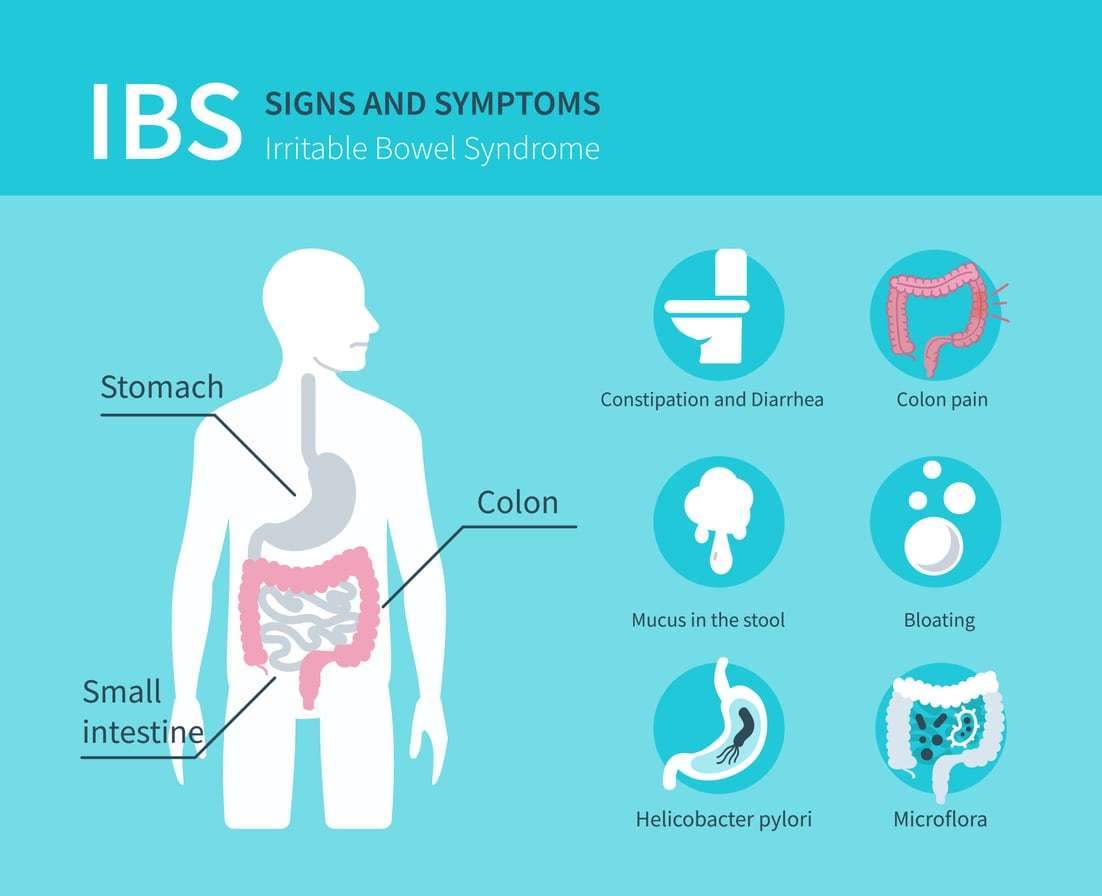Ultra-processed foods may cause symptoms of irritable bowel syndrome (IBS). Variety may be the spice of life for some people, but for those with IBS (irritable bowel syndrome), variety in the diet can be problematic. It’s not surprising that a condition with the word “irritable” in its name can become more persistent when exposed to certain triggers. Triggers can bring about symptoms of diarrhea, constipation, bloating, and abdominal pain, and other stomach discomforts.

Common IBS Triggers
Identifying and avoiding IBS food triggers often helps lessen the impact of irritable bowel syndrome. Although stress, certain medications, and menstruation in women are all potential triggers for some people, dietary triggers are the most common.
The specific triggers vary from one person to the next, but certain foods are more common triggers including:
- Dairy
- Fried Foods
- Caffeine
- Artificial Sweeteners
- Sugar
- Alcohol
- Chocolate
- Beans & Legumes
- Gluten
- High Fructose Corn Syrup
What Are Ultra-Processed Foods and Why Do They Trigger IBS Symptoms?
Processed foods aren’t always listed as a top dietary trigger for IBS, but new research shows evidence that there’s a stronger relationship than previously believed. Foods vary in the level of processing they undergo, and some are worse than others.
The same type of food can be found in the supermarket in various stages of processing. For example, strawberries in the produce department are unprocessed. They’ve been picked, washed, and offered for sale without being altered. The strawberries you find in the frozen foods are minimally processed. When sugar is added, it is no longer considered minimally processed. When the strawberries are combined with sugar, flour, high fructose corn syrup, sodium, and additives to make a pie in the deli, the final product becomes an ultra-processed food. These foods are the least healthy and the most likely ones to trigger IBS symptoms.
Ultra-processed foods include items such as soda, cakes, bread, and frozen meals. Basically, any type of food that is mass-produced is typically "ultra-processed" food. Looking back at the list of common IBS triggers, almost every type of processed foods contain at least one of these ingredients. The more ingredients there are in a food, the more likely it is to contain additives that trigger IBS symptoms. Food additives, like emulsifiers, colors, and preservatives are proven to cause hypersensitivity reactions in some IBS patients. Even if you know which ones act as triggers for your symptoms, they are often hidden in ultra-processed foods. Trying to determine the cause of these reactions can be like looking for the proverbial “needle in a haystack.”
Added sugar, salt, trans fat, and food additives have a negative impact on everyone’s health. For anyone with IBS, the impact can be far greater. An increase in symptoms can lead to nutritional deficiencies and a lower quality of life. Attempts by experts to limit the use of additives in food processing have had little success. It’s up to the individual to learn their triggers and eat a diet made up of healthy, nutritious foods that haven’t been altered.
Reading Food Labels
Some processed foods aren’t bad for you, especially those that fall into the minimally processed category. Many people prefer frozen vegetables and fruit to those sold fresh because they are frozen while at their peak. Just make sure there are no added ingredients including sugar or salt.
Food labels list the ingredients in order from those with the greatest content to those with the least. The longer the list of ingredients, the more processed it is. A good way to avoid ultra-processed foods is to stay away from those with long ingredient lists that have words you don’t recognize.
The Low FODMAP Diet
Fermentable Oligosaccharides, Disaccharides, Monosaccharides, And Polyols, or FODMAPs, are short-chain carbohydrates that the small intestine doesn’t tolerate well. They increase the amount of fluid produced in the bowel during digestion, leading to bloating and changes in the speed of digestion. They also increase gas, exacerbating IBS symptoms.
People with IBS who follow a low FODMAP diet experience a large reduction in their symptoms. The diet reduces the consumption of some types of carbohydrates including lactose, fructose, fructans, GOS, and Polyols. The diet also removes ultra-processed foods from your daily food intake. For help managing your IBS systems, contact the GI Associates team today. Schedule your consultation to ensure all of your screenings are up-to-date and to learn your options for treatment.
